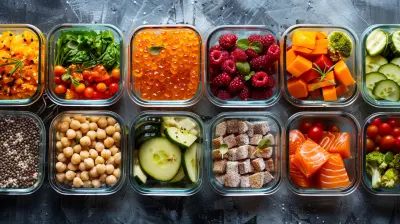Meal Timing: Does When You Eat Matter for Weight Loss?
29 May 2025
When it comes to weight loss, most people focus on what they eat—counting calories, tracking macros, and choosing healthier options. But what about when you eat? Could the timing of your meals make a difference in shedding those extra pounds?
In this article, we’ll dive deep into the science of meal timing and its impact on weight loss. We’ll look at the benefits of eating at certain times, how your body's internal clock influences digestion, and whether skipping meals or late-night snacking could be sabotaging your goals. 
The Science Behind Meal Timing
Your body operates on an internal clock, known as the circadian rhythm. This natural cycle regulates sleep, metabolism, and even digestion. Just like how your sleep schedule affects your energy levels, your eating schedule can influence your metabolism and fat storage.Studies suggest that eating in sync with your circadian rhythm may help improve digestion, stabilize blood sugar levels, and even promote weight loss. But eating at odd hours—like late at night—can disrupt this balance, leading to weight gain and other metabolic issues. 
Does Meal Timing Affect Weight Loss?
1. Eating Earlier in the Day May Be Better
Ever heard the phrase, "Eat breakfast like a king, lunch like a prince, and dinner like a pauper"? There’s actually some science behind it!Research suggests that people who eat a larger breakfast and a lighter dinner tend to lose more weight than those who do the opposite. That’s because metabolism tends to be more active in the morning, processing food more efficiently.
A study published in the journal Obesity found that participants who ate a big breakfast burned more calories throughout the day, had lower insulin levels, and felt fuller longer compared to those who ate a larger dinner.
2. Late-Night Eating Can Lead to Weight Gain
Picture this: You’re binge-watching your favorite TV show, and suddenly, you find yourself reaching for a bag of chips at midnight. Sound familiar?Eating late at night doesn’t just pack on extra calories—it can also mess with your body’s metabolism. When you eat late, your body is less efficient at processing food, increasing the likelihood of fat storage.
Research has shown that people who eat late at night tend to consume more calories overall, leading to gradual weight gain over time. Additionally, late-night snacks are often unhealthy, high in sugar and refined carbs, which can spike insulin and promote fat storage.
If you’re craving a late-night snack, opt for something light and protein-rich, like Greek yogurt or a handful of almonds, rather than sugary treats. 
Intermittent Fasting: A Timing-Based Approach to Weight Loss
Intermittent fasting (IF) has gained popularity as a powerful weight-loss strategy, focusing on when you eat rather than what you eat. IF involves cycling between periods of eating and fasting, with common methods like:- 16/8 Method – Fasting for 16 hours and eating during an 8-hour window
- 5:2 Diet – Eating normally for five days and restricting calories on two non-consecutive days
- Alternate-Day Fasting – Eating every other day while fasting on alternate days
The benefits of intermittent fasting include:
✅ Increased fat burning – When fasting, the body switches from burning glucose to stored fat for energy.
✅ Improved insulin sensitivity – Fasting helps lower blood sugar levels, reducing the risk of diabetes.
✅ Caloric reduction without restriction – Since IF naturally limits eating hours, people often eat fewer calories overall. 
Does Skipping Breakfast Help or Hurt Weight Loss?
There’s an ongoing debate about breakfast. Some say it’s the most important meal of the day, while others argue that skipping it could aid in weight loss.Here’s the truth: It depends on the person.
For some, eating a protein-packed breakfast helps control cravings and prevents overeating later in the day. For others, skipping breakfast (as seen in intermittent fasting) can help naturally reduce calorie intake without feeling deprived.
If you’re not hungry in the morning, forcing yourself to eat might not be necessary. But if skipping breakfast leads to mindless snacking or binge-eating in the evening, it might be worth keeping it in your routine.
Practical Tips for Optimizing Meal Timing
If you’re wondering how you can tweak your eating schedule for better weight loss results, here are some simple strategies:✅ Eat When Your Metabolism is Most Active
Aim for most of your calories earlier in the day. A balanced breakfast and lunch can keep energy levels stable and prevent overeating at night.✅ Stick to a Consistent Eating Schedule
Try to eat at the same times each day. A regular eating pattern helps regulate metabolism and prevents energy crashes.✅ Limit Late-Night Snacking
If you tend to snack mindlessly at night, try closing the kitchen after dinner. Brush your teeth early to signal to your brain that eating time is over.✅ Prioritize Protein and Fiber
No matter when you eat, focus on protein-rich and fiber-packed foods to keep you full and satisfied.✅ Try Intermittent Fasting
If you struggle with late-night snacking or irregular eating habits, experimenting with intermittent fasting may help regulate hunger cues and calorie intake.Conclusion
So, does meal timing matter for weight loss? Absolutely! While what you eat is crucial, when you eat can also play a big role in your metabolism, hunger levels, and fat storage. Eating earlier in the day, avoiding late-night snacks, and experimenting with intermittent fasting are great strategies to support weight loss.That said, the best diet is one you can stick to long-term. Whether you’re an early eater or prefer a time-restricted eating window, find what works best for your lifestyle and body. After all, consistency is the real key to success!
all images in this post were generated using AI tools
Category:
Weight LossAuthor:

Sophia Wyatt
Discussion
rate this article
3 comments
Aisha Spencer
Great insights! I appreciate the emphasis on how meal timing can influence our weight loss journey. Thank you!
June 18, 2025 at 5:04 PM

Sophia Wyatt
Thank you for your kind words! I'm glad you found the insights helpful. Happy to contribute to your weight loss journey!
Mercy Wright
Meal timing can play a role in weight loss, but individual preferences and lifestyle factors are also crucial. Focus on balanced nutrition and consistent eating patterns for sustainable results, rather than just the clock.
June 1, 2025 at 3:14 PM

Sophia Wyatt
Thank you for your insight! You're absolutely right—balanced nutrition and consistency are key for sustainable weight loss, alongside meal timing.
Kade Cooper
Great article! I loved how you explored the impact of meal timing on weight loss. It's fascinating to see how small changes can make a big difference!
May 31, 2025 at 2:36 PM

Sophia Wyatt
Thank you! I'm glad you enjoyed it and found the insights on meal timing impactful!



